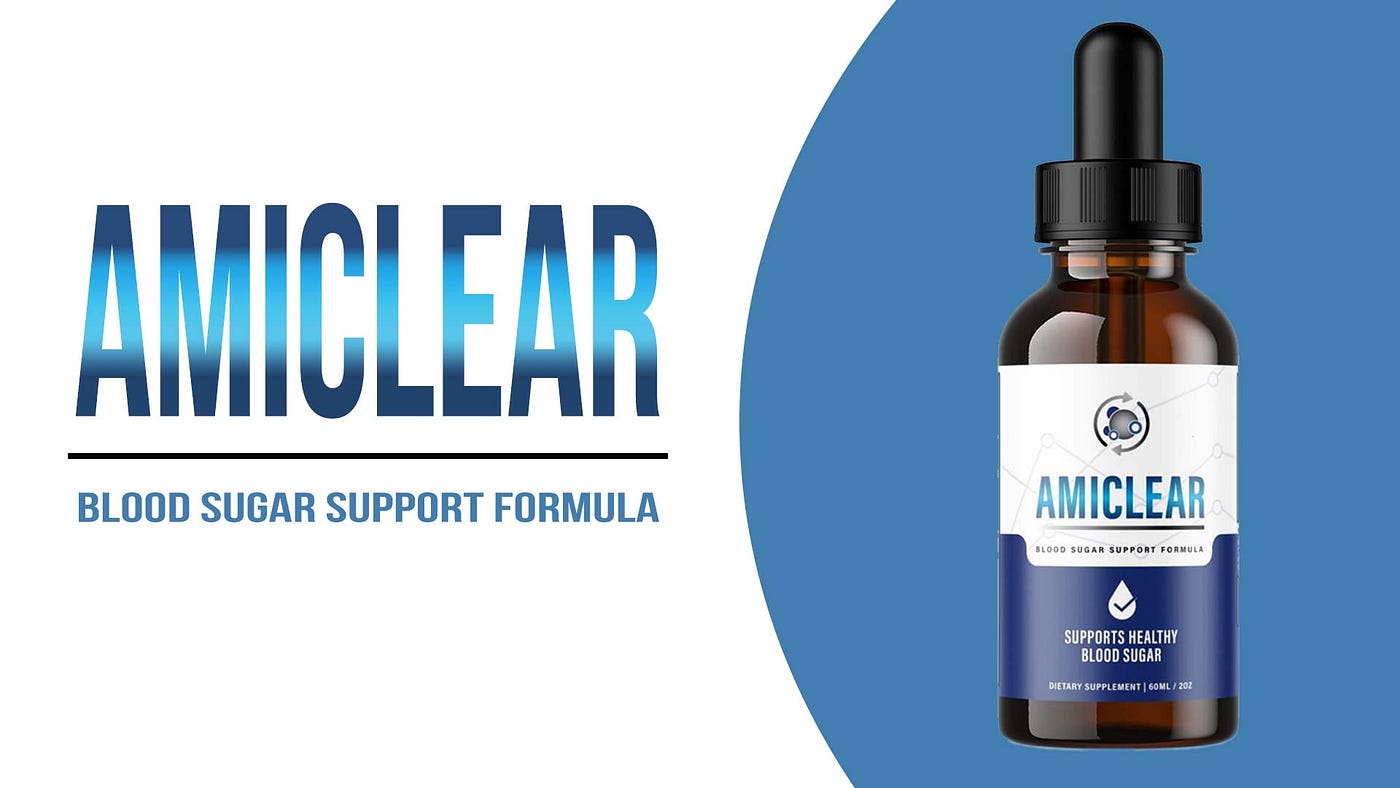- Amiclear: A Comprehensive Review
- Introduction
- Understanding Amiclear
- Key Ingredients and Their Scientific Backing
- Efficacy of Amiclear
- Safety and Side Effects
- Dosage and Administration
- Mechanisms of Action
- Comparisons with Other Supplements
- Regulatory Status and Quality Control
- Consumer Perceptions and Market Presence
- Cost-Effectiveness
- Expert Opinions
- Future Research Directions
- Conclusion
- References
Amiclear: A Comprehensive Review
Introduction
Amiclear is a dietary supplement that has garnered attention for its potential benefits in managing blood sugar levels. With the rising prevalence of diabetes and pre-diabetes conditions worldwide, the interest in natural and supplemental remedies has surged. This comprehensive review aims to provide an in-depth analysis of Amiclear, examining its ingredients, scientific backing, efficacy, safety, and user experiences.

Understanding Amiclear
Amiclear is marketed as a natural solution to support healthy blood sugar levels. It contains a blend of botanical extracts, vitamins, and minerals known for their potential in regulating glucose metabolism and improving overall metabolic health. The primary ingredients include berberine, cinnamon extract, chromium, alpha-lipoic acid, and other supportive compounds.
Key Ingredients and Their Scientific Backing
Berberine
Berberine is a bioactive compound extracted from various plants, including Berberis, Oregon grape, and goldenseal. It has been traditionally used in Chinese and Ayurvedic medicine. Recent scientific research supports its efficacy in managing blood sugar levels.
Mechanism of Action:
Berberine activates AMP-activated protein kinase (AMPK), a critical enzyme in glucose metabolism. AMPK activation improves insulin sensitivity, enhances glucose uptake by cells, and reduces hepatic glucose production.
Scientific Evidence:
A study published in the journal Metabolism found that berberine is as effective as metformin, a common diabetes medication, in reducing blood glucose levels in type 2 diabetic patients. Another study in Diabetes Care demonstrated significant improvements in fasting blood glucose and hemoglobin A1c (HbA1c) levels among participants taking berberine.
Cinnamon Extract
Cinnamon, particularly Cinnamomum cassia, is well-known for its potential to lower blood sugar levels. It contains compounds like cinnamaldehyde that have been studied for their effects on glucose metabolism.
Mechanism of Action:
Cinnamon enhances insulin sensitivity and mimics insulin activity, promoting glucose uptake by cells. It also delays gastric emptying, which helps moderate postprandial blood sugar spikes .
Scientific Evidence:
A meta-analysis published in the Journal of Medicinal Food concluded that cinnamon supplementation significantly reduces fasting blood glucose and improves lipid profiles in patients with type 2 diabetes . Another study in Diabetes Research and Clinical Practice reported that cinnamon extract improved glycemic control and increased insulin sensitivity in type 2 diabetes patients.
Chromium
Chromium is an essential trace mineral that plays a crucial role in carbohydrate and lipid metabolism. It is often included in supplements for its potential to improve blood sugar control.
Mechanism of Action:
Chromium enhances the action of insulin by facilitating its binding to insulin receptors and improving glucose uptake by cells .
Scientific Evidence:
A systematic review in the Journal of Clinical Pharmacy and Therapeutics found that chromium supplementation led to significant reductions in fasting blood glucose and HbA1c levels in individuals with diabetes . Another study published in Diabetes Technology & Therapeutics demonstrated that chromium picolinate supplementation improved glycemic control and reduced insulin resistance in type 2 diabetic patients .
Alpha-Lipoic Acid (ALA)
Alpha-lipoic acid is a potent antioxidant that has been studied for its role in managing diabetes and its complications.
Mechanism of Action:
ALA improves insulin sensitivity, reduces oxidative stress, and enhances glucose uptake by muscle cells. It also regenerates other antioxidants, providing a comprehensive defense against oxidative damage associated with diabetes.
Scientific Evidence:
Research published in Diabetes Care showed that ALA supplementation improved insulin sensitivity and reduced fasting blood glucose levels in patients with type 2 diabetes. A study in Free Radical Biology and Medicine found that ALA supplementation significantly reduced oxidative stress markers in diabetic patients .
Other Ingredients
Amiclear also includes other supportive ingredients such as gymnema sylvestre, Coleus, Astragalus, African Mango, Ginseng, bitter melon, and fenugreek, which have traditional uses in blood sugar management and are supported by varying degrees of scientific evidence.

Efficacy of Amiclear
Clinical Studies
While individual ingredients of Amiclear have demonstrated efficacy in scientific studies, comprehensive clinical trials specifically on Amiclear are limited. Most of the available data are extrapolated from studies on individual components.
User Testimonials
Anecdotal evidence and user reviews often highlight significant improvements in blood sugar control, increased energy levels, and better overall health. However, these accounts should be interpreted with caution as they are subjective and not scientifically validated.
Safety and Side Effects
Safety Profile
Amiclear’s ingredients are generally considered safe when used at recommended dosages. Berberine, cinnamon, chromium, and alpha-lipoic acid have all undergone extensive safety evaluations.
Potential Side Effects
– Berberine: Gastrointestinal discomfort, such as diarrhea, constipation, and abdominal pain, especially at higher doses .
– Cinnamon: Generally safe, but excessive intake can cause liver toxicity due to coumarin content, particularly in Cinnamomum cassia .
– Chromium: High doses can lead to kidney and liver damage, though such cases are rare.
– Alpha-Lipoic Acid: Mild side effects like skin rash and nausea, with rare instances of hypoglycemia.
Interactions with Medications
Berberine can interact with several medications, including anticoagulants, antihypertensives, and antibiotics, potentially altering their effects. It is crucial for users to consult healthcare professionals before starting Amiclear, especially if they are on medication.
Dosage and Administration
The recommended dosage of Amiclear varies depending on the formulation and concentration of active ingredients. It is typically advised to follow the manufacturer’s guidelines and consult a healthcare provider to determine the appropriate dosage based on individual health needs and conditions.
Mechanisms of Action
Synergistic Effects
The combination of ingredients in Amiclear is designed to work synergistically, enhancing the overall efficacy in blood sugar regulation. For instance, berberine and cinnamon both enhance insulin sensitivity, while alpha-lipoic acid reduces oxidative stress, providing a multi-faceted approach to managing diabetes.
Metabolic Pathways
Amiclear ingredients target multiple metabolic pathways, including:
– Glucose Uptake: Enhancing glucose transport into cells.
– Insulin Sensitivity: Improving the body’s response to insulin.
– Oxidative Stress Reduction: Protecting cells from damage caused by high blood sugar.
– Anti-inflammatory Effects: Reducing inflammation that can exacerbate insulin resistance.
Comparisons with Other Supplements
Berberine Supplements
While standalone berberine supplements are popular for blood sugar management, Amiclear offers additional benefits through its multi-ingredient formulation. This combination can provide more comprehensive metabolic support compared to single-ingredient supplements.
Cinnamon Extracts
Cinnamon supplements are effective, but they may not address all aspects of glucose metabolism as comprehensively as a multi-ingredient supplement like Amiclear.
Multivitamins with Chromium
Multivitamins often contain chromium, but the concentration may not be sufficient to significantly impact blood sugar levels. Amiclear, designed specifically for blood sugar management, ensures optimal dosages of chromium and other supportive ingredients.
Regulatory Status and Quality Control
Regulatory Approval
Dietary supplements like Amiclear are regulated differently across countries. In the United States, the FDA does not approve dietary supplements for safety and efficacy before they reach the market but monitors them post-market. Manufacturers are responsible for ensuring product safety and proper labeling.
Quality Assurance
Reputable manufacturers of Amiclear are expected to follow Good Manufacturing Practices (GMP) to ensure product quality, purity, and potency. Third-party testing for contaminants and ingredient verification can provide additional assurance of product integrity.
Consumer Perceptions and Market Presence
Popularity and User Base
Amiclear has gained a significant following among individuals seeking natural blood sugar management solutions. Its popularity can be attributed to positive user experiences, effective marketing, and the growing interest in natural health products.
Market Competition
Amiclear competes with other blood sugar management supplements, including those from well-known brands and emerging companies. Its unique blend of ingredients and positive user feedback help it stand out in a crowded market.
Cost-Effectiveness
Price Comparison
Amiclear is priced competitively compared to other high-quality blood sugar management supplements. The cost reflects the comprehensive formulation and quality of ingredients used.
Value for Money
Given its multi-ingredient approach and the potential benefits for blood sugar regulation and overall metabolic health, Amiclear offers good value for money. Users often find the investment worthwhile for the health benefits experienced.
Expert Opinions
Endocrinologists
Many endocrinologists acknowledge the potential benefits of supplements like Amiclear for supporting blood sugar management, especially when combined with lifestyle modifications such as diet and exercise. However, they emphasize the importance of scientific validation through clinical trials.
Nutritionists
Nutritionists often recommend supplements like Amiclear as part of a broader dietary strategy to manage blood sugar levels. They highlight the importance of a balanced diet rich in whole foods, alongside supplementation.
Future Research Directions
Clinical Trials
More comprehensive clinical trials on Amiclear are needed to validate its efficacy and safety as a combined formulation. Such studies would provide stronger evidence for its use in managing blood sugar levels.
Mechanistic Studies
Further research into the specific mechanisms of action and synergistic effects of Amiclear’s ingredients would enhance understanding and support its therapeutic use.
Long-Term Safety
Long-term studies to assess the safety of Amiclear, especially in populations with chronic health conditions, would provide valuable insights into its risk-benefit profile.
Conclusion
Amiclear presents a promising natural option for supporting blood sugar management, backed by the scientific evidence of its individual ingredients. While more comprehensive clinical trials are needed to confirm its efficacy as a combined supplement, the existing research and user testimonials are encouraging. Safety remains a crucial consideration, particularly regarding potential interactions with medications. As with any supplement, it is essential to consult healthcare professionals before starting Amiclear, especially for individuals with existing health conditions or those on medication.
By offering a multi-faceted approach to glucose metabolism and overall metabolic health, Amiclear stands out in the crowded market of blood sugar management supplements. With continued research and quality assurance, it has the potential to become a staple in the management of diabetes and pre-diabetes, contributing to better health outcomes and improved quality of life for many users.
References
1. Zhang, Y., Li, X., Zou, D., Liu, W., Yang, J., Zhu, N., … & Jiang, Y. (2010). Treatment of type 2 diabetes and dyslipidemia with the natural plant alkaloid berberine. 59(2), 285-292.
2. Yin, J., Xing, H., & Ye, J. (2008). Efficacy of berberine in patients with type 2 diabetes mellitus., 57(5), 712-717.
3. Allen, R. W., Schwartzman, E., Baker, W. L., Coleman, C. I., & Phung, O. J. (2013). Cinnamon use in type 2 diabetes: an updated systematic review and meta-analysis. Annals of Family Medicine, 11(5), 452-459.
4. Lu, T., Sheng, H., Wu, J., Cheng, Y., Zhu, J., & Chen, Y. (2012). Cinnamon extract improves fasting blood glucose and glycosylated hemoglobin level in Chinese patients with type 2 diabetes. Diabetes Research and Clinical Practice, 97(1), 62-68.
5. Abdul-Ghani, M. A., & DeFronzo, R. A. (2009). Pathogenesis of insulin resistance in skeletal muscle. Journal of Biomedicine and Biotechnology, 2009, 476279.
6. Wang, Z. Q., Qin, J., Martin, J., Zhang, X. H., Pang, J., Cheng, Q., … & Zhang, R. (2007). Phenotype of subjects with type 2 diabetes mellitus may determine clinical response to chromium supplementation. Metabolism, 56(10), 1652-1655.
7. Evans, J. L., Goldfine, I. D., Maddux, B. A., & Grodsky, G. M. (2002). Are oxidative stress–activated signaling pathways mediators of insulin resistance and β-cell dysfunction? Diabetes, 51(1), 1-11.
8. Jacob, S., Henriksen, E. J., Tritschler, H. J., Augustin, H. J., & Dietze, G. J. (1999). Improvement of insulin-stimulated glucose-disposal in type 2 diabetes after repeated parenteral administration of thioctic acid. Free Radical Biology and Medicine*, 27(3-4), 309-314.
9. Cefalu, W. T., & Hu, F. B. (2004). Role of chromium in human health and in diabetes. Diabetes Care, 27(11), 2741-2751.
10. Blevins, S. M., Leyva, M. J., Brown, J., Wright, J., Scofield, R. H., & Aston, C. E. (2007). Effect of cinnamon on glucose and lipid levels in non–insulin-dependent type 2 diabetes. Diabetes Care, 30(9), 2236-2237.
11. The Science Behind Amiclear And its Effects on Blood Sugar Levels
12. StrictionD: Your Ultimate Guide to Natural Blood Sugar Control





